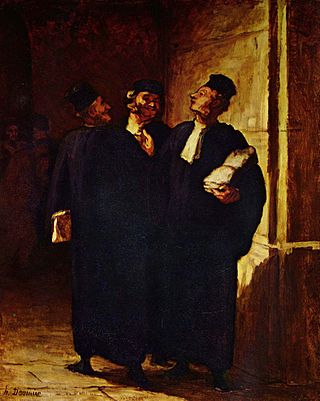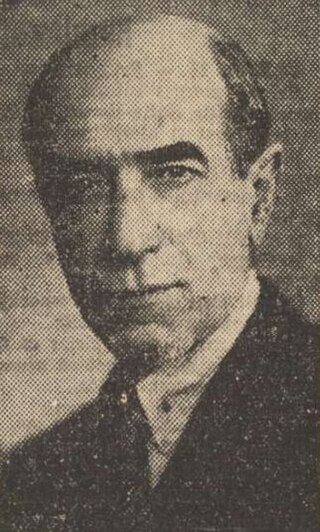
A barrister is a type of lawyer in common law jurisdictions. Barristers mostly specialise in courtroom advocacy and litigation. Their tasks include arguing cases in courts and tribunals, drafting legal pleadings, researching the law and giving legal opinions.

A lawyer is a person who practices law. The role of a lawyer varies greatly, across different legal jurisdictions. A lawyer can be classified as an advocate, attorney, barrister, canon lawyer, civil law notary, counsel, solicitor, legal executive, and public servant — with each role having different functions and privileges. Working as a lawyer generally involves the practical application of abstract legal theories and knowledge to solve specific problems. Some lawyers also work primarily in advancing the interests of the law and legal profession.

An advocate is a professional in the field of law. Different countries and legal systems use the term with somewhat differing meanings. The broad equivalent in many English law–based jurisdictions could be a barrister or a solicitor. However, in Scottish, Manx, South African, Italian, French, Spanish, Portuguese, Scandinavian, Polish, Israeli, South Asian and South American jurisdictions, "advocate" indicates a lawyer of superior classification.
A bar association is a professional association of lawyers as generally organized in countries following the Anglo-American types of jurisprudence. The word bar is derived from the old English/European custom of using a physical railing to separate the area in which court business is done from the viewing area for the general public.
The call to the bar is a legal term of art in most common law jurisdictions where persons must be qualified to be allowed to argue in court on behalf of another party and are then said to have been "called to the bar" or to have received "call to the bar". "The bar" is now used as a collective noun for barristers, but literally referred to the wooden barrier in old courtrooms, which separated the often crowded public area at the rear from the space near the judges reserved for those having business with the court. Barristers would sit or stand immediately behind it, facing the judge, and could use it as a table for their briefs.

A bar council or bar association, in a common law jurisdiction with a legal profession split between solicitors and barristers or advocates, is a professional body that regulates the profession of barristers. In such jurisdictions, solicitors are generally regulated by the law society.
Legal ethics are principles of conduct that members of the legal profession are expected to observe in their practice. They are an outgrowth of the development of the legal profession itself.
A bar examination is an examination administered by the bar association of a jurisdiction that a lawyer must pass in order to be admitted to the bar of that jurisdiction.
An admission to practice law is acquired when a lawyer receives a license to practice law. In jurisdictions with two types of lawyer, as with barristers and solicitors, barristers must gain admission to the bar whereas for solicitors there are distinct practising certificates.
Continuing legal education (CLE), also known as mandatory or minimum continuing legal education (MCLE) or, in some jurisdictions outside the United States, as continuing professional development, consists of professional education for attorneys that takes place after their initial admission to the bar. Within the United States, U.S. attorneys in many states and territories must complete certain required CLE in order to maintain their U.S. licenses to practice law. Outside the United States, lawyers in various jurisdictions, such as British Columbia in Canada, must also complete certain required CLE. However, some jurisdictions, such as the District of Columbia and Israel, recommend, but do not require, that attorneys complete CLE.
Continuing legal education is required of members of the Integrated Bar of the Philippines (IBP) to ensure that throughout their career, they keep abreast with law and jurisprudence, maintain the ethics of the profession and enhance the standards of the practice of law.
Grigore Iunian was a Romanian left-wing politician and lawyer. A member of the National Liberal Party (PNL) during the 1910s, he rallied with the Peasants' Party (PȚ) after World War I, and followed it into the National Peasants' Party (PNȚ), before leaving in 1933 to create the Radical Peasants' Party (PȚR), over which he presided until his death.
The Virginia State Bar (VSB) is the administrative agency of the Supreme Court of Virginia created to regulate, improve and advance the legal profession in Virginia. Membership in good standing in the VSB is mandatory for attorneys wishing to practice law in the Commonwealth of Virginia. The VSB is thus an integrated bar.

The Alabama State Bar is the integrated (mandatory) bar association of the U.S. state of Alabama.

Istrate N. Micescu was a Romanian lawyer, Law and Political Science professor at the University of Bucharest's Law Department, and politician who served as the Minister of Foreign Affairs of Romania.

The Council of Bars and Law Societies of Europe (CCBE) is an association gathering together bar associations of 32 countries in Europe (those of the European Union, of the European Economic Area and of Switzerland), The United Kingdom, and an additional eleven associate and observer members. The CCBE represents around a million European lawyers before EU institutions mainly, but also before other international organisations. The CCBE is an international non-profit organisation (AISBL) under Belgian law and has its seat in Brussels.

The Union Internationale des Avocats (UIA) or International Association of Lawyers is an international non-governmental organisation, created in 1927, that brings together more than 2,200 legal professionals from all over the world.
Bar Council of Bihar is the regulatory and statutorily representative body for lawyers practicing law in the state of Bihar. It was constituted as per the mandatory requirement as per Advocates Act, 1961 and Bar Council of India. In March 1953, S. R. Das as head of the 'All India Bar Committee', proposed the creation of the apex body as an All-India Bar Council and Bar council at state levels and submitted a report to the Central Government of India. Members of the Bar Council are elected from among members enrolled and practicing as lawyers practicing law in the state of Bihar and they represent the state in Bar Council of India meetings. Bar Council of a place designs standards of professional conduct to be followed by members, and designs etiquettes and has the power to enforce disciplinary guidelines over the members of bar council.
Bar Council of Orissa is the regulatory and statutorily representative body for lawyers practicing law in the state of Orissa. It was constituted as per the mandatory requirement as per Advocates Act, 1961 and Bar Council of India. In March 1953, S. R. Das as head of the 'All India Bar Committee', proposed the creation of the apex body as an All-India Bar Council and Bar council at state levels and submitted a report to the Central Government of India. Members of the Bar Council are elected from among members enrolled and practicing as lawyers practicing law in the state of Orissa and they represent the state in Bar Council of India meetings. Bar Council of a place designs standards of professional conduct to be followed by members, and designs etiquettes and has the power to enforce disciplinary guidelines over the members of bar council.
Bar Council of Uttarakhand is the regulatory and statutorily representative body for lawyers practicing law in the state of Uttarakhand. It was constituted as per the mandatory requirement as per Advocates Act, 1961 and Bar Council of India. In March 1953, S. R. Das as head of the 'All India Bar Committee', proposed the creation of the apex body as an All India Bar Council and Bar council at state levels and submitted a report to the Union Government of India. Members of the Bar Council are elected from among members enrolled and practicing as lawyers practicing law in the state of Uttarakhand and they represent the state in Bar Council of India meetings. Bar Council of a place designs standards of professional conduct to be followed by members, and designs etiquettes and has the power to enforce disciplinary guidelines over the members of bar council.







